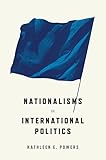Nationalisms in international politics by Kathleen E. Powers.
Material type: TextLanguage: English Series: Princeton studies in political behaviorPublisher: [2022]Copyright date: ©2022Description: ix, 295p.: illustrations ; 24 cmContent type:
TextLanguage: English Series: Princeton studies in political behaviorPublisher: [2022]Copyright date: ©2022Description: ix, 295p.: illustrations ; 24 cmContent type: - text
- unmediated
- volume
- 0691224579
- 9780691224572
- 0691224560
- 9780691224565
- Nationalism
- International Politics
- Foreign Policy
- Nationalism -- Cross-cultural studies
- International relations
- Nationalisme
- Nationalisme -- Études transculturelles
- Relations internationales
- nationalism
- international relations
- International relations
- Relations internationales
- International policy
- Politics
- Nationalism
- Nationalisme
- International relations
- Nationalism
- JC311 .P675 2022
- V1:19.N R2
| Item type | Current library | Home library | Call number | Status | Barcode | |
|---|---|---|---|---|---|---|
 Textbook
Textbook
|
Central Library | Central Library | V1:19.N R2 (Browse shelf(Opens below)) | Available | CL1682263 |
Includes bibliographical references (pages 259-289) and index.
Nationalisms in international politics -- Varieties of nationalism and attitudes about conflict and cooperation -- Nationalisms, support for conflict escalation, and militarism -- American nationalisms and support for conflict -- Supranationalisms and support for security cooperation in Europe -- Conclusions.
With nationalism on the rise around the world, many worry that nationalistic attitudes could lead to a surge in deadly conflict. To combat this trend, federations like the European Union have tried to build inclusive regional identities to overcome nationalist distrust and inspire international cooperation. Yet not all nationalisms are alike. Nationalisms in International Politics draws on insights from psychology to explore when nationalist commitments promote conflict-and when they foster cooperation. Challenging the received wisdom about nationalism and military aggression, Kathleen Powers differentiates nationalisms built on unity from those built on equality, and explains how each of these norms give rise to distinct foreign policy attitudes. Combining innovative US experiments with fresh analyses of European mass and elite survey data, she argues that unity encourages support for external conflict and undermines regional trust and cooperation, whereas equality mitigates militarism and facilitates support for security cooperation. Nationalisms in International Politics provides a rigorous and compelling look at how different forms of nationalism shape foreign policy attitudes, and raises important questions about whether transnational identities increase support for cooperation or undermine it.
There are no comments on this title.

